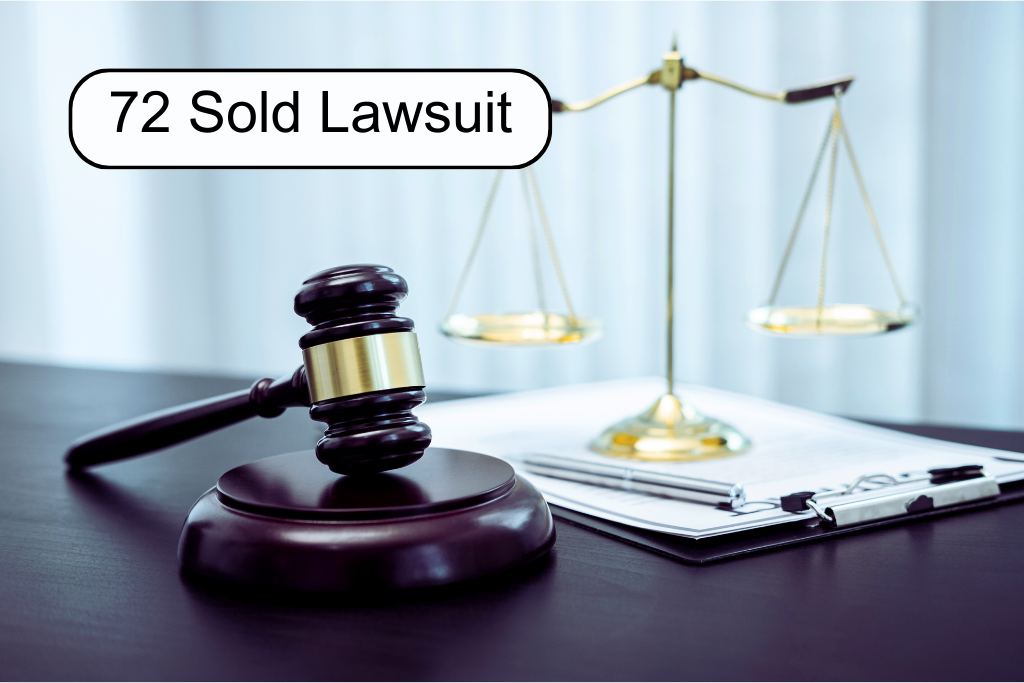The 72 Sold Lawsuit has captured attention across the real estate community and homeowners alike. As one of the leading real estate programs designed to sell homes within 72 hours, 72 Sold has faced legal challenges related to its business practices. The company promises homeowners quick sales and competitive pricing, but The 72 Sold Lawsuit raises questions about whether these claims are realistic or misleading.
This article will thoroughly explore the details of the lawsuit, analyze the company’s practices, and help homeowners understand if 72 Sold is the right choice for selling their homes.
Table of Contents
What is 72 Sold?
Before delving into The 72 Sold Lawsuit, let’s explore what 72 Sold is. The company was created with the goal of simplifying and speeding up the home selling process. Traditional real estate agents typically take weeks or even months to sell a property, but 72 Sold promises to do it in just 72 hours.
This promise is achieved by using a pre-marketing strategy to build demand before a home is listed for sale. By concentrating buyer interest into a 72-hour window, the company claims that it can sell homes faster and potentially for a higher price.
But is this too good to be true? The 72 Sold Lawsuit questions whether the company’s marketing strategies are misleading and whether the results are as successful as they claim.
The 72 Sold Lawsuit: Overview
The 72 Sold Lawsuit is a legal case that challenges the company’s advertising and fee structures. Homeowners have raised concerns about whether they were given accurate information about the speed of the sale, the final sale price, and the fees involved. The lawsuit alleges that 72 Sold may have misled homeowners about these aspects, causing financial loss for some clients.
The lawsuit has triggered an investigation into how 72 Sold operates and whether they are violating any laws related to consumer protection or false advertising.
The Allegations Against 72 Sold
There are several major allegations outlined in The 72 Sold Lawsuit, most of which focus on the company’s practices around transparency and ethics. Here are the key points:
1. False Advertising: Plaintiffs in the lawsuit argue that 72 Sold made false or exaggerated claims in their marketing, especially regarding the 72-hour sale guarantee. Many homeowners allege that their homes were not sold within 72 hours, contrary to what the company promised.
2. Hidden Fees: Some homeowners allege that they were not fully informed about all of the fees involved with using 72 Sold’s services. These fees may have been sprung on them at the closing, which is often too late for the seller to back out.
3. Overstated Property Valuations: Another key accusation in **The 72 Sold Lawsuit** is that the company overestimates the sale price of homes, leading to unrealistic expectations. Many sellers claim that their homes sold for far less than what was initially promised by 72 Sold agents.
4. Unclear Contract Terms: Some homeowners argue that the contracts they signed were unclear or misleading, especially concerning commission fees and cancellation penalties.
How Does 72 Sold Work?
To understand the concerns raised in The 72 Sold Lawsuit, it’s important to know how the company operates. 72 Sold follows a relatively straightforward process designed to speed up the home selling experience. Here’s a breakdown:
1. Initial Consultation: Homeowners meet with a local agent affiliated with 72 Sold who assesses the property. During this stage, the agent provides an estimated sale price and explains the company’s process.
2. Pre-Marketing: Before the home is officially listed, 72 Sold engages in a pre-marketing campaign to generate interest among potential buyers. This phase is critical for creating a sense of competition among buyers, which is intended to drive up the price during the sale.
3. 72-Hour Sale Event: Once enough interest has been generated, the home is placed on the market for 72 hours. During this time, potential buyers are encouraged to submit their highest offers. Ideally, this leads to a bidding war that results in a higher sale price for the homeowner.
The Weekend Sale and 72 Hours Concept
A cornerstone of 72 Sold’s strategy is the focus on a short, intense marketing period. The idea is that by condensing the entire selling process into a weekend, buyers will feel a sense of urgency and place higher bids.
However, The 72 Sold Lawsuit challenges this concept, alleging that the promise of a quick sale is not always realistic. In slower markets or for homes in less desirable areas, sellers may not receive any offers during the 72-hour window, forcing them to extend the sale period, which contradicts the company’s marketing claims.
72 Sold’s Commissions and Fees
One of the central complaints in The 72 Sold Lawsuit involves the company’s commission structure. While 72 Sold positions itself as an innovative alternative to traditional real estate agents, many sellers are surprised to find that the commissions charged by the company are not much different from standard agents.
Typically, 72 Sold agents charge around 6% commission, similar to what a traditional real estate agent might charge. The lawsuit argues that these fees are not always disclosed upfront, leading to frustration and financial losses for homeowners who were expecting a cheaper alternative.
Additionally, there are allegations of hidden fees that homeowners weren’t informed about until the closing stage. These could include marketing fees, administrative fees, and other charges that reduce the final payout for the seller.
The Legal Grounds of The 72 Sold Lawsuit
The 72 Sold Lawsuit rests on several legal arguments related to consumer protection and real estate law. The plaintiffs in the lawsuit claim that 72 Sold violated regulations surrounding fair advertising practices, misrepresentation, and fee disclosures.
1. Consumer Protection Violations: One of the key legal issues in the lawsuit is whether 72 Sold violated consumer protection laws by making false or misleading claims in their marketing materials. If the company promised a 72-hour sale but failed to deliver on that promise, they could be liable for damages.
2. Failure to Disclose Fees: The lawsuit also accuses 72 Sold of failing to properly disclose all of the fees associated with their services. In most real estate transactions, full transparency is required by law. If 72 Sold did not adequately inform homeowners of all costs, they could face significant penalties.
3. Misrepresentation of Property Values: Some homeowners argue that 72 Sold misrepresented the expected sale price of their homes, which could be a violation of real estate laws regarding fair market value assessments.
How The Lawsuit Affects Homeowners
For homeowners who have used or are considering using 72 Sold, the 72 Sold Lawsuit has important implications. If the company is found guilty of the allegations against them, homeowners who were misled or overcharged may be entitled to compensation.
The lawsuit could also lead to changes in how 72 Sold operates. The company may be required to revise its marketing practices, provide more transparency around fees, and adjust its business model to comply with any new regulations that arise from the legal proceedings.
72 Sold vs. Other Real Estate Models
One of the reasons The 72 Sold Lawsuit has gained so much attention is because it challenges a growing trend in the real estate industry: the rise of alternative selling models. Companies like 72 Sold, iBuyers (e.g., Opendoor), and flat-fee MLS services have disrupted the traditional agent-driven real estate model. But how does 72 Sold compare to these other options?
1. 72 Sold vs. Traditional Agents: Traditional agents take a more hands-on approach, listing homes on the MLS and showing them to potential buyers over an extended period. 72 Sold offers a faster, more aggressive strategy, but at a similar commission rate.
2. 72 Sold vs. iBuyers: iBuyers like Opendoor offer cash for homes upfront, eliminating the need for showings and negotiations. While this is convenient, it often results in a lower sale price compared to what 72 Sold might offer through its competitive bidding process.
3. 72 Sold vs. Flat-Fee MLS: Flat-fee MLS services allow homeowners to list their property on the MLS without hiring an agent, potentially saving thousands in commissions. However, this requires more work on the part of the homeowner, whereas 72 Sold provides a full-service option with a higher fee.
72 Sold Reviews and Complaints
Reviews of 72 Sold are mixed, with some homeowners praising the speed and efficiency of the process, while others express disappointment. These are a few common topics found in reviews:
Positive Reviews: Many homeowners report that they were able to sell their homes quickly
and for a fair price. They appreciated the company’s focus on pre-marketing and its streamlined process.
Negative Reviews: Common complaints include higher-than-expected fees, failure to sell within the promised 72-hour window, and lower final sale prices compared to what was initially estimated.
Pros and Cons of 72 Sold
Let’s break down the pros and cons of using 72 Sold to sell your home.
Pros:
Fast Sale: If your home generates enough interest, you could sell it in a matter of days.
Competitive Bidding: The 72-hour sale window can create a bidding war, driving up the price.
Full-Service Model: 72 Sold handles everything from marketing to negotiations, which is convenient for busy homeowners.
Cons:
High Fees: 72 Sold charges commissions similar to traditional agents, despite marketing itself as a more affordable option.
Not Always 72 Hours: Some homes don’t sell within the promised timeframe, leading to disappointment.
Potential for Misrepresentation: The lawsuit highlights concerns about transparency and accuracy in the company’s promises.
Should You Sell With 72 Sold?
Despite the lawsuit, 72 Sold may still be a good option for some homeowners, especially those looking for a fast sale. However, it’s important to weigh the risks and do thorough research. Make sure to ask about fees upfront, get multiple opinions on your home’s value, and read reviews from other sellers before making a decision.
How Home Sellers Can Protect Themselves
To avoid issues like those raised in The 72 Sold Lawsuit, here are some tips for homeowners:
1. Read the Fine Print: Make sure you fully understand the terms of your contract before signing.
2. Get a Second Opinion: Have another real estate agent assess your home’s value to ensure you’re getting a fair estimate.
3. Ask About Fees: Don’t be afraid to ask for a detailed breakdown of all fees and commissions before agreeing to work with 72 Sold.
4. Consult an Attorney: If you’re concerned about the legality of your contract, consult with a real estate attorney.
72 Sold Lawsuit: Industry Impact
The 72 Sold Lawsuit is more than just a legal battle; it’s a wake-up call for the entire real estate industry. As alternative models like 72 Sold gain popularity, there is a growing need for regulation to protect consumers and ensure transparency. The outcome of this lawsuit could set important precedents for other companies in the industry, potentially leading to stricter rules around advertising, fee disclosure, and fair market value assessments.
Conclusion: Key Takeaways from The 72 Sold Lawsuit
The 72 Sold Lawsuit serves as a reminder for homeowners to be cautious when choosing a real estate service. While the promise of a quick sale is appealing, it’s essential to fully understand the terms of the deal, especially when it comes to fees and the realistic sale price of your home.
As the legal case unfolds, homeowners who are considering using 72 Sold should do their homework, read reviews, and consult with professionals before making a decision. In the fast-changing real estate market, protecting your financial interests is more important than ever.
FAQ’s
Is 72 Sold legit?
Yes, 72 Sold is a legitimate company with a unique business model. However, it has faced legal challenges related to its marketing and fee structure, which are still being resolved in court.
Is 72 Sold a national company?
72 Sold operates in multiple states but is not available nationwide. It is most active in states like Arizona, where the company originated.
What is 72 Sold all about?
72 Sold is a real estate service that promises to sell homes within 72 hours by concentrating buyer interest into a short sale window. It uses aggressive marketing and pre-listing strategies to achieve this goal.


